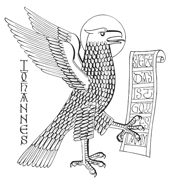
Part Four: |
Lord, Teach Us To Pray |
Fourth Petition: |
“ |
Give Us This Day Our Daily Bread” |
 This is the turning point in the Our Father. Where the first
three petitions were directed to the glory of God, from now on they are
concerned with our needs.
This is the turning point in the Our Father. Where the first
three petitions were directed to the glory of God, from now on they are
concerned with our needs.
The Church’s tradition finds two levels of request for nourishment in this petition. We ask for the food we need for our souls, and the sustenance we need for our bodies.
Spiritual NourishmentWhen St. Pius X issued his decree on frequent Holy Communion, he explained that frequent means daily reception of the Blessed Sacrament. He based his teaching on the comparison with the food that we daily need to sustain our bodies, and the “all but unanimous interpretation” of the Fathers of the Church. They say that “daily bread” in the Lord’s Prayer means daily Communion. The pope concludes that “the Eucharistic Bread should be our daily food.” It is assumed that, in receiving Holy Communion, a person has sanctifying grace. The reason is obvious. No less than food for the body presumes that the body has its natural life, so the Eucharistic food for the soul presumes that the soul is supernaturally alive. There is also another spiritual food that we pray for in this petition. That is the nourishment of truth that the human mind needs for its daily sustenance. No less than the body needs material food to remain healthy and stay alive, so the soul has to be fed daily on God’s revealed word to maintain its spiritual vigor and life. Christ’s long discourse on the promise of the Eucharist uses the same word “Bread” to refer to both kinds of spiritual nourishment: His own living Body in the Holy Eucharist, and His revealed word in the truths of salvation.
Daily Needs of the BodyOn the material side of our bodily needs, the fourth petition asks God to provide the hungry with food, the homeless with shelter, the sick and the aged with adequate care, the victims of addiction to drugs and alcohol with help to recover from indulgence and the resulting disease. This petition applies to both impoverished and affluent societies, which often co-exist in the same country and even the same city or locality. It is no exaggeration to say that in praying “Give us this day our daily bread” we are literally begging the Lord to move the hearts of men to share with one another of the resources that He makes available for respectable human living. It is a sad irony of the modern world in an age of unprecedented wealth, the world is going through a period of superhuman suffering. There are many reasons for this paradox. But one of them is the cold indifference to the bodily sufferings of countless millions in every region of the globe. When Pope John Paul II wrote his apostolic exhortation on The Christian Meaning of Human Suffering, he touched on every aspect of this petition of the Our Father. We are to pray, he said, especially that God in His mercy, will inspire a legion of Good Samaritans to see the physical needs of other people and come to their selfless aid. Following the parable of the Gospel, we could say that suffering, which is present under so many different forms in our human world, is also present in order to unleash love in the human person, that unselfish gift of one’s “I’ on behalf of other people, especially those who suffer…. The world of human suffering calls for, so to speak, another world: the world of human love; and in a certain sense owes to suffering that unselfish love which stirs in one’s heart and actions. The person who is a “neighbor” cannot indifferently pass by the suffering of another…. He must “stop,” “sympathize” just like the Samaritan in the gospel parable. The parable in itself expresses a deeply Christian truth, but one that at the same time is very universally human. It is not without reason that, also in ordinary speech any activity on behalf of the suffering and needy is called “Good Samaritan” work (Salvifici doloris, VII, 29). Whatever else we pray for, when we ask for our daily bread, we are asking the God of mercy to inspire countless Good Samaritans to reflect this mercy in their loving concern for the suffering of others.  Copyright © 2002 Inter Mirifica
Pocket Catholic Catechism |